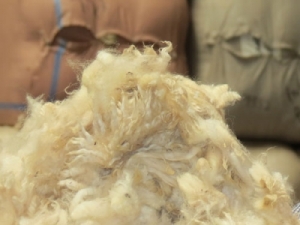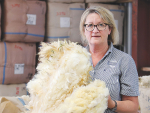Apart from that there were minimal changes.Of the 8,600 bales on offer 88% sold. Currency had minimal impact with the weighted indicator for the main trading currencies down only 0.47% week on week.
Dawson says the listed volumes of fine crossbred longer shears were 1 to 2% dearer with the shorter types firm to 2% easier.
Coarse crossbred fleece were firm to 2.5% dearer. Longer coarse shears were firm to 2% firmer with the high volumes of short shears on offer 1 to 2% easier.
Fine first lambs were firm to 3% dearer with coarse lambs 3 to 4% cheaper. Oddments were firm to 5% easier.
There are now quite disparate price levels between the limited type selection and styles in the North Island and the more varied offering from the South Island making direct comparisons difficult.
There was good competition with Australasia, Western Europe and United Kingdom principal, supported by Middle East, India and China.
The next sale on June 2 comprises about 6,500 bales from the South Island.














